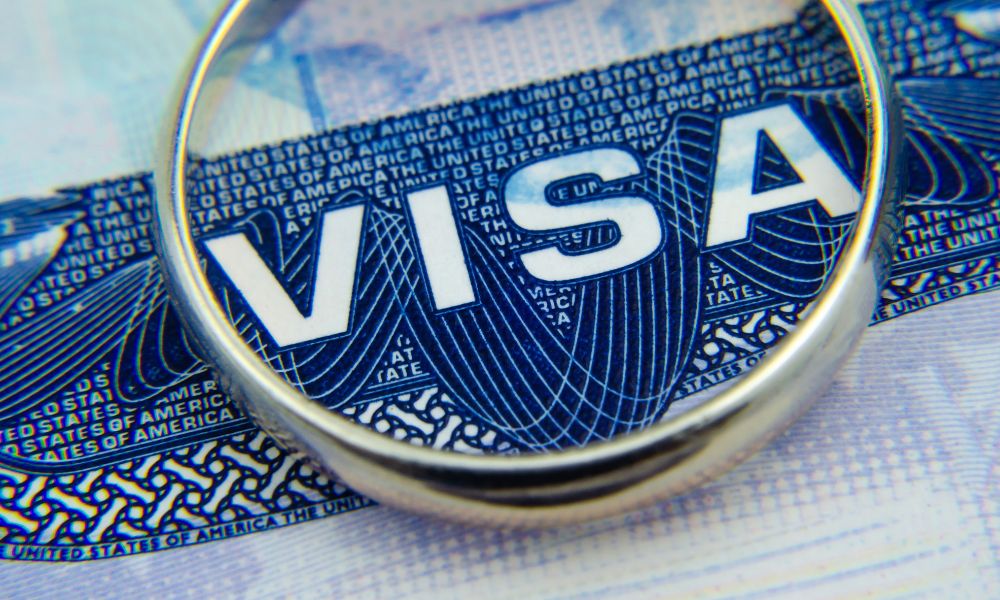
Love knows no boundaries, a fact often celebrated in the union of cross-cultural couples navigating the path toward marriage in the United States through the K-1 visa process. Popularly known as the fiancé(e) visa, the K-1 allows the foreign partner of a US citizen to enter the United States, provided the couple marries within 90 days of arrival.
However, beyond the legal and bureaucratic hurdles lies a more intimate challenge: bridging the cultural gap. Understanding and navigating cultural differences are pivotal for K-1 visa couples aiming for a harmonious life together. In this guide, we explore eight cultural considerations for K-1 visa couples and offer practical advice on how to navigate them with grace and love.
Language Barriers
Language is not just a tool for communication but also a vessel of culture, humor, and emotional expression. For couples hailing from different linguistic backgrounds, misunderstandings can occur even in simple conversations. Overcoming this barrier requires patience, practice, and sometimes, the assistance of language learning apps or classes. Viewing language differences not as hurdles but as opportunities to grow closer can transform this challenge into a bonding activity.
Family Dynamics and Expectations
In many cultures, marriage is a union not just between two individuals but between two families. The expectations surrounding this can vary greatly, from the degree of parental involvement to the traditions upheld during and after the wedding. Understanding each other’s family dynamics is crucial in setting boundaries and managing expectations, ensuring both partners feel respected and valued. Open, transparent communication with each other’s families can also foster healthy relationships.
Traditions and Holidays
Celebrating traditions and holidays from both cultures can enrich a relationship, offering a taste of each partner’s heritage. However, it might also mean making tough choices about which traditions to prioritize or how to celebrate them in a way that feels authentic to both people. Open communication and creativity in forging new traditions can imbue these celebrations with personal significance for the couple.

Food and Dietary Preferences
Food is a celebration of culture, but it can also be a source of contention for couples with differing dietary habits or preferences. Whether it’s adapting to a partner’s preferred cuisine or finding a balance between different dietary practices, food can become an exploration of compromise and mutual respect. Shared meals can become delightful explorations of cultures, provided both partners approach these differences with an open mind.
Cooking together is another great way to learn more about each other in a low-pressure setting. Plus, learning how to make your partner’s favorite meals shows you care about their background and cultural preferences.
Social Norms and Etiquette
Navigating the subtleties of social norms and etiquette, from greeting gestures to dress codes, can be perplexing for someone immersed in a new culture. Missteps can lead to uncomfortable situations or misunderstandings. Here, the key lies in educating each other about these nuances, fostering an environment of learning and patience. Engaging in activities that highlight each other’s cultures can also offer practical insight into these social norms. Above all, respecting each other’s cultural backgrounds and avoiding judgment is crucial.
Values and Beliefs
Religion, core values, and beliefs are the bedrocks of many decisions in life and shape one’s worldview and daily practices. Couples may find themselves at odds over these differences, which can resonate across aspects of their lives, from wedding ceremonies to child-rearing practices. Honest discussions about values and beliefs, approached with an open heart, can help the couple identify common ground and areas where compromise or support is possible.
Financial Management
Money management is a practical consideration for any couple. However, broader cultural attitudes toward saving, spending, and financial planning can magnify these discussions. In other words, disparities in financial upbringing and expectations can lead to conflicts. It’s essential for couples to discuss their financial goals and management strategies early on and establish a mutual understanding and plan that acknowledges both perspectives.

Gender Roles and Relationship Dynamics
Gender roles and expectations in relationships can differ significantly across cultures, influencing everything from household responsibilities to career aspirations. Couples need to confront these differences directly, negotiating roles that fit their unique partnership rather than adhering rigidly to cultural norms. This conversation is an ongoing process that may evolve with the relationship itself. It’s a good idea for both partners to candidly discuss their expectations prior to getting married to avoid potential disagreements down the road.
Practical Advice for Navigating Cultural Differences
Beyond understanding these cultural dimensions, the success of a cross-cultural partnership often relies on a few practical strategies. Maintaining curiosity about each other’s backgrounds is beneficial for both parties, who should actively seek to learn and participate in one another’s cultural practices. Establishing open lines of communication where both partners feel safe expressing their concerns and desires can mitigate misunderstandings and foster a deeper connection.
Seeking support from other cross-cultural couples, whether through community groups or online platforms, can also provide valuable insight and encouragement. These connections can offer practical advice and emotional support, reminding couples they’re not alone in their experiences. Finally, staying connected to each other’s families and cultures, especially when physically separated, can keep the cultural exchange alive and maintain a sense of belonging.
Bridging Cultural Gaps
The journey of K-1 visa couples is often marked by anticipated bureaucratic challenges, but the unspoken cultural nuances are what truly test the strength and resilience of the couple’s bond. Recognizing and navigating the cultural considerations for K-1 visa couples with patience, understanding, and love can turn them from potential obstacles into sources of enrichment and discovery. Beauty often lies in differences, so embracing each partner’s cultural uniqueness will foster a loving relationship in which both individuals feel valued and respected.
For K-1 visa couples, the effort to bridge cultural gaps is an investment in the foundation of their future partnerships. It’s an encouragement to celebrate differences and build a shared life that flourishes from the richness of two distinct backgrounds coming together as one.
Navigating the legal complexities of the fiancé(e) visa process can be overwhelming for couples. When you need a fiancé visa attorney in New Orleans, Gahagan Law Firm is here to help every step of the way. We can ensure that you file all the necessary immigration documents correctly. Plus, we work quickly, so you won’t need to wait months to hear from us. Instead, you can focus on your happily ever after. Contact us to schedule an appointment today.
